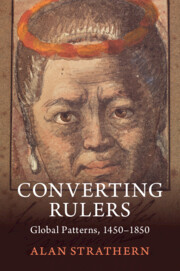Book contents
- Converting Rulers
- Converting Rulers
- Copyright page
- Dedication
- Contents
- Figures, Maps and Tables
- Preface and Acknowledgements
- Abbreviations
- Part I Concepts
- Part II Cases
- KONGO
- 2 The Miracles of Kongo, 1480–1530
- JAPAN
- SIAM
- HAWAII
- Part III Global Patterns
- Appendix: A Note on the Religious Typology in Relation to Gender and in Relation to Violence
- Glossary of Theoretical Terms
- Bibliography
- Index
2 - The Miracles of Kongo, 1480–1530
from KONGO
Published online by Cambridge University Press: 07 November 2024
- Converting Rulers
- Converting Rulers
- Copyright page
- Dedication
- Contents
- Figures, Maps and Tables
- Preface and Acknowledgements
- Abbreviations
- Part I Concepts
- Part II Cases
- KONGO
- 2 The Miracles of Kongo, 1480–1530
- JAPAN
- SIAM
- HAWAII
- Part III Global Patterns
- Appendix: A Note on the Religious Typology in Relation to Gender and in Relation to Violence
- Glossary of Theoretical Terms
- Bibliography
- Index
Summary
Chapter 2 tells the story of the conversion of the kings of Kongo. Nzinka a Nkuwu (King João) was baptised in 1491 but later apostatised and was succeeded by his son, King Afonso, who established an enduring Catholic dynasty in west central Africa. After acknowledging the significance of religious diplomacy, the chapter shows how the realm of immanent power was the most critical factor in the Kongo case. A close reading of the evidence indicates that the Portuguese or their ruler may have been considered to have a special association with the realm of the ancestors, while baptism was received as an initiation granting unusual powers, particularly in battle. This helps explain King João’s apostasy and is most apparent in the miraculous interpretation of the military victory that brought Afonso to the throne in 1506. However, it is also argued that conversion may have helped Afonso solidify his control of the religious field, as expressed in the iconoclastic sweeps that happened at several points in 1480–1530. The theme of cultural appeal is illustrated by a more general importation of the Portuguese culture by elites. Afonso is presented as a visionary with ambitions for societal recreation.
- Type
- Chapter
- Information
- Converting RulersKongo, Japan, Thailand, Hawaii and Global Patterns, 1450–1850, pp. 47 - 84Publisher: Cambridge University PressPrint publication year: 2024

